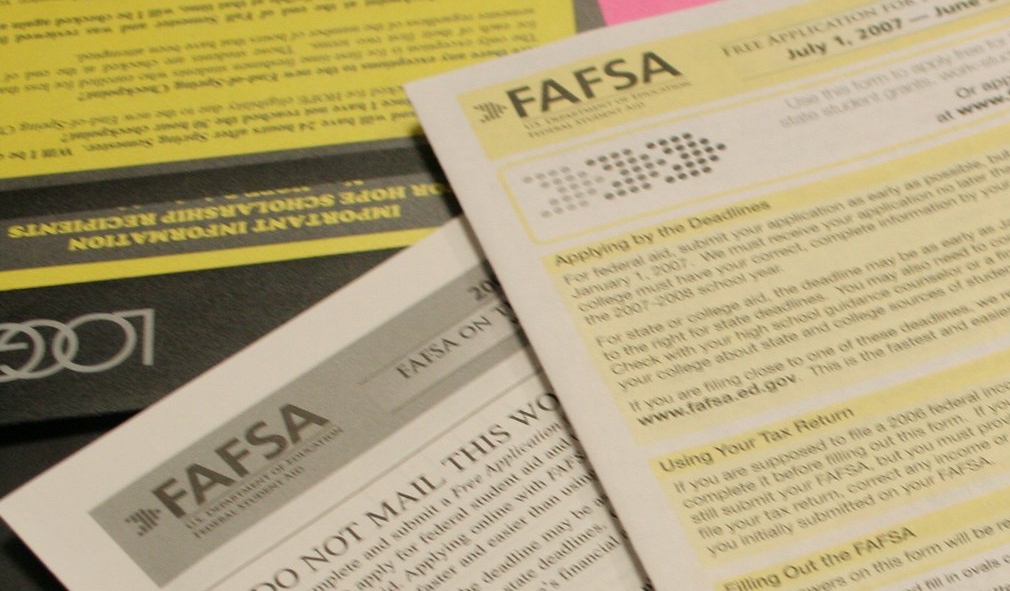While they wait for expected data from the “simplified” federal financial aid application forms for students, college and university financial aid officers fret over missed deadlines and data they will not receive. Christine Taylor, Director of Financial Aid & Veterans Services at Bellevue College, said the new Free Application for Student Aid (FAFSA) will no longer ask students if they plan to live on campus.
“We have to figure out how to set up our cost-of-attendance budgets,” Taylor said. Last year, Washington residents paid $4,259 in tuition and fees at Bellevue College. Students who lived on campus could receive up to $26,275 in financial aid to cover the full cost of attendance – including books, room, board, and other education-related expenses. Students who lived with families off campus could receive up to $8,596. “Do we put all dependent students on an on-campus budget and independent students on an off-campus budget?” Taylor asked. “Or do we try to just create a single budget for cost of attendance?” These questions become critical when housing represents such a large portion of the total cost.
The simplified FAFSA has been bedeviled by delays and other confusions. It no longer includes questions about funding from grandparents and other non-custodial relatives. This could benefit some families, who may increase total aid by combining contributions from family members with federal grants. Those who have more than one student in college may need that extra help because federal grants no longer allow a “sibling discount.”
Immigrant families face additional hurdles. The online FAFSA form still does not work for students who are in the country legally but whose undocumented parents have not registered with the social security administration.
Colleges and universities started receiving sample Institutional Student Information Records (ISIR) last week but won’t have enough data to fully inform their decision-making processes about financial aid until mid-March. Most institutions aren’t expected to finalize financial aid offers until sometime in April.
S&P Global Ratings predicted that the delays are likely to hurt some colleges and universities more than others. Those with large numbers of students eligible for need-based Pell grants and those serving large numbers of minority students could experience major challenges. Schools with highly competitive admissions could also struggle as students may have a very short window from receipt of financial aid offers until the deadline to accept admissions offers.
Some schools have opted to create their own financial aid forms while others have delayed the traditional May 1 decision date. The University of Washington extended the FAFSA priority filing date from January 15 to February 28 but still shows May 1 as “decision day.”
Taylor thinks the “time crunch” for financial aid offers could benefit community colleges such as Bellevue. Washington residents who complete the FAFSA can qualify for federal and state aid targeted at low- and middle-income families. This could make community college free or nearly free for many students.
“Students hoping to go to for-profit or selective institutions really need that financial aid package to see if they can afford to attend,” Taylor said. “But community colleges might see an uptick in enrollment from students who decide to opt for a less expensive option this year.”
Taylor worries about having enough staff to process the ISIR data when her office finally receives it. All community colleges in Washington changed their student information systems about two years ago. This led to a “mass exodus of financial aid professionals.” Taylor said her office of 13 currently has five unfilled positions. “I’m less worried about the short-term delay in receiving data than the long-term shortage of staff. How are we going to create financial aid professionals for the future?”
The National Association of Financial Aid Professionals announced formation of an emergency corps of financial aid consultants to help institutions through the “crunch” of being short staffed and on short timelines for financial aid processing this year. The Department of Education allocated $50 million to set up a “concierge service” to help colleges process financial aid packages and to deploy help to “under-resourced” campuses. But many financial aid professionals have feared that offers for financial-aid assistance, just like the “simplified” FAFSA itself, have been too little and too late.
Discover more from Post Alley
Subscribe to get the latest posts sent to your email.
